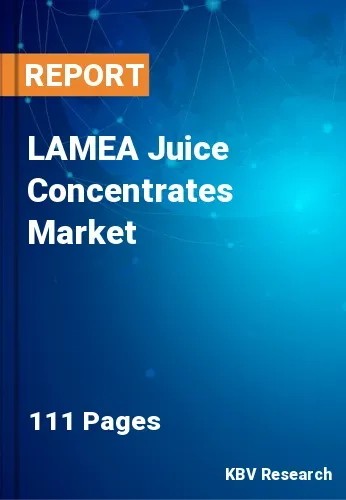The Latin America, Middle East and Africa Juice Concentrates Market would witness market growth of 9.7% CAGR during the forecast period (2022-2028).
Unclarified depeptidized juice enters the batch tank and is quickly pumped through membrane modules by a high-efficiency centrifugal pump. A thin top layer forms on the membranes' surface, and some liquid enters the permeate tank through the membranes' channels as a ready product. To get the highest concentration, retentate is condensed. After that, it might go via defiltration to get extraction. Juice is pumped into finer juice tanks after the ultrafiltration process and then returned to the evaporation station to condense.
Feeding finely juice to heating columns, which flow down as a falling film, is the condensing process. The column is heated from the outside by hot steam, which also reaches the boiling and evaporating points of liquid, releasing it to the following condensation level. Vapors are sent to the separator where they are heated further. To reach the desired concentration level, the product undergoes additional evaporation processes.
Concentrate that has concentrated in the evaporation station is cooled to about 5-8°C before being sent to the warehouse. Modern warehouses are equipped with a full pipeline installation and mechanisms that make it possible to archive information. The touch panel displays the operational state of the room's gadgets and associated systems, making it possible to monitor and manage the system from a single location to make a perfect juice concentrate.
South Africa is a land of magnificent fruit and one of the major fruit-producing nations in the world. Fruit farming in South Africa includes a wide array of fruits, from apples and oranges to table grapes and dragon fruit. Fruit makes up more than 50% of agricultural exports, contributing 2.5% to South Africa's growth domestic profit (GDP). More than 4.7 million tons of fruit are produced in South Africa, of which 59 percent are exported, 28 percent are used for processing, and 12 percent are sold domestically, according to data from Fruit South Africa.
The Brazil market dominated the LAMEA Juice Concentrates Market by Country in 2021, and would continue to be a dominant market till 2028; thereby, achieving a market value of $2,302.1 million by 2028.The Argentina market is experiencing a CAGR of 10.3% during (2022 - 2028). Additionally, The UAE market would display a CAGR of 9.5% during (2022 - 2028).
Based on Type, the market is segmented into Fruit Juice Concentrates and Vegetables Juice Concentrates. Based on Fruit Juice Concentrates Type, the market is segmented into Orange, Apple, Pineapple, Berries and Others. Based on Application the market is segmented into Beverage, Soups & Sauces, Dairy, Bakery & Confectionery and Others. Based on Ingredient, the market is segmented into Single Fruit/Vegetable Concentrates and Multi-Fruit/Vegetable Concentrates. Based on Form, the market is segmented into Clear Concentrate, Powdered Concentrate and Frozen Concentrate. Based on countries, the market is segmented into Brazil, Argentina, UAE, Saudi Arabia, South Africa, Nigeria, and Rest of LAMEA.
Free Valuable Insights: The Global Juice Concentrates Market is Predict to reach $90.8 Billion by 2028, at a CAGR of 4.7%
The market research report covers the analysis of key stake holders of the market. Key companies profiled in the report include Archer Daniels Midland Company, Südzucker AG, Ingredion, Incorporated, SunOpta, Inc, Kerry Group PLC, Sensient Technologies Corporation, Symrise AG, Döhler GmbH, IPRONA SPA, and Kanegrade Limited.
By Type
By Application
By Ingredient
By Form
By Country

Our team of dedicated experts can provide you with attractive expansion opportunities for your business.

